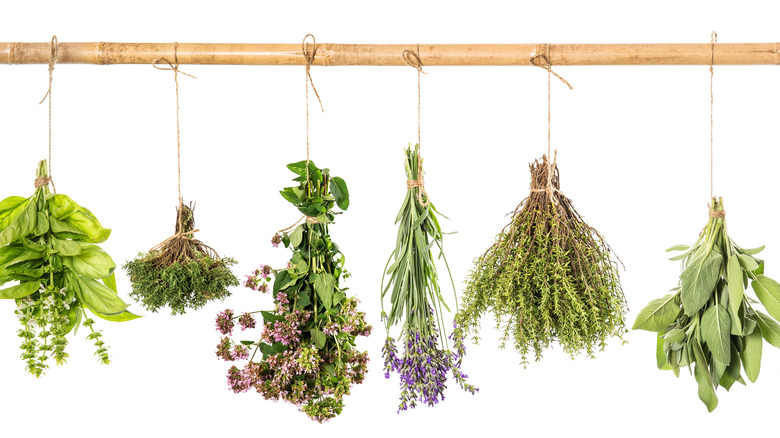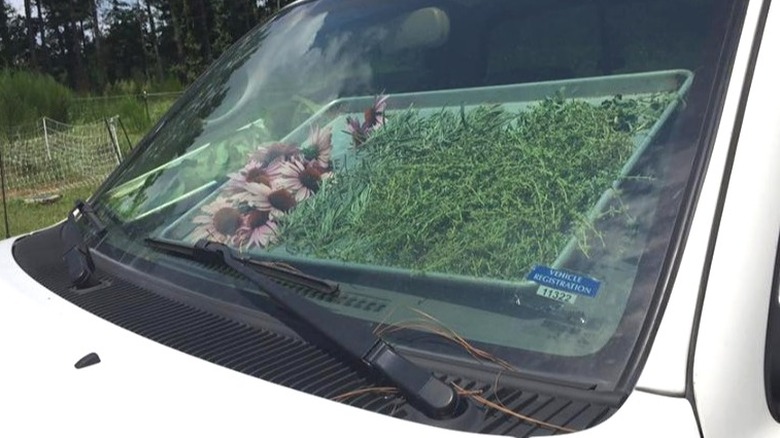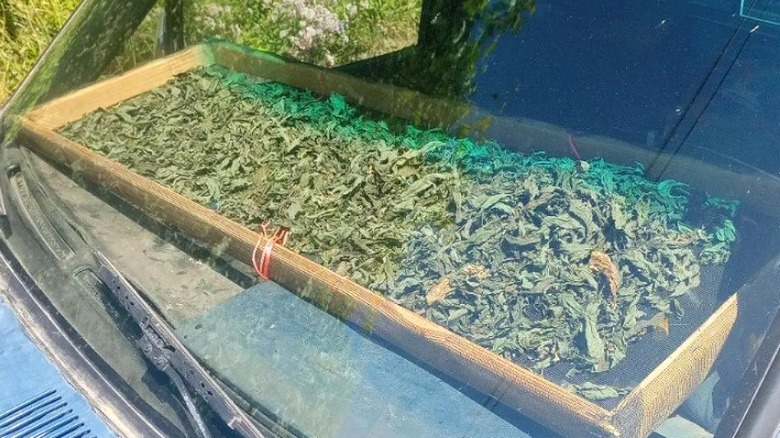Why You Should Dry Garden Herbs In Your Car
Have you ever considered making your own dried herbs instead of purchasing them at the store? Sure, those little bottles are great for upcycling, but when it comes to the environment, they're not the most sustainable, per CBS News. Think of all the steps those bottles full of herbs took to get to that shelf. The picking, processing, packaging, and traveling can all add up to a rather heavy carbon footprint.
Picking and drying your own herbs guarantees that what you're eating is fresh and hasn't been sitting on a shelf for an unspecified amount of time. It's also cost-effective, because you can make as little or as much as you need and store it in one of your snazzy little upcycled jars. Typically, you'll need equipment to make your own dried herbs. This is when space and oftentimes finances create road blocks. If your kitchen is lacking in size or storage, or if a dehydrator falls under the want category and not the need category, you can always head out to the driveway and turn to the next best thing: your car.
How much time do you have?
There's not much to drying herbs. It really depends on the actual plant and if you're bundling or keeping everything loose. Herbs like rosemary, sage, and thyme can be gathered in bunches and hung out to air dry. According to Coffee Sock, this process takes up to a couple weeks or more. Using a dehydrator can take anywhere from 4 to 12 hours, per Herb Cottage, while ovens can be unpredictable at best. Microwaves are not advisable either and for the same reasons; temperatures vary and herbs can burn quickly. Meanwhile, your car is basically a supersized solar dehydrator sitting in the driveway just waiting to be useful. Because the sun is so powerful, its heat can transform large quantities of fresh herbs and flowers into their dried counterparts within a matter of hours. A standard kitchen dehydrator can't compare when it comes to volume.
For prep, you can keep hardwood herbs intact, but more delicate greens like cilantro, parsley, and dill should be de-stemmed. Laidback Gardener says to simply lay out the leaves on a large sheet pan, but really anything with a flat bottom will work like a screen, tray, or basket. Line them up on the dashboard, which is the hottest zone in the car because it gets the most direct sun exposure. Rolling up the windows and closing the doors will make the drying process go quite quickly.
Some extra tips
Keeping your vehicle airtight (with the windows all rolled up) can also prevent debris, bugs, dust, and other contaminants from messing with the process. This is normally accomplished by using paper bags with holes, notes Penn State Extension, so you're saving yourself some extra work with this hack.
If you've already decided to try out the solar auto dehydration method for your herbs, it's important to be mindful of what you're going to be processing. Have you ever left freshly cut flowers in your car for a prolonged amount of time? When you return and open the door, you're immediately consumed by a powerful odor. Fragrant flowers are one thing. Chives, onions, and dill are a completely different animal. So unless you don't mind your vehicle smelling like a food truck, you might want to stick to dehydrating herbs that lean towards a more floral, sweet, or pleasant scent and not so much the ones that remind you of Taco Tuesday.


